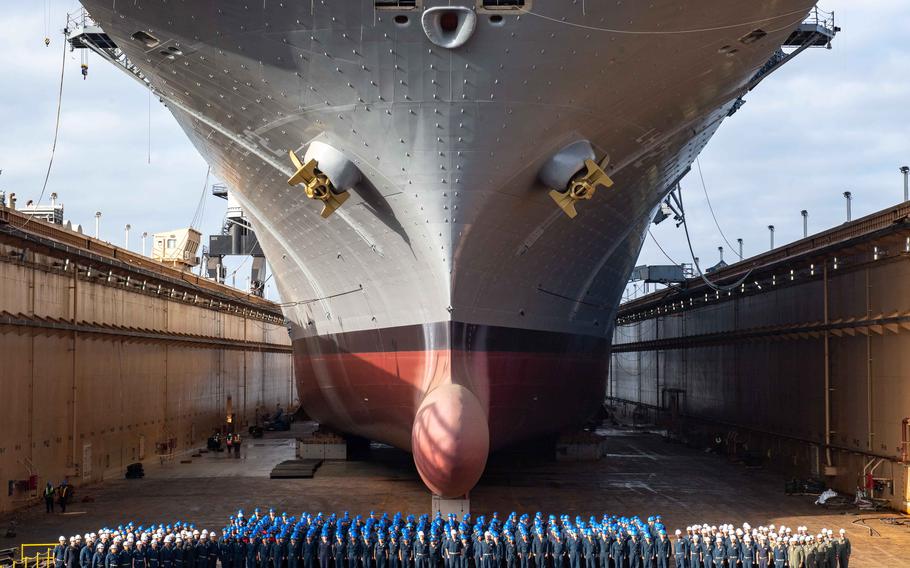
Secretary of the Navy Carlos Del Toro tours Bayonne Dry Dock in Bayonne, N.J., Aug. 15, 2023. Del Toro has ordered that service members assigned to ships in dry dock may refuse nonjudicial punishment and ask for a court-martial. (Shannon E. Renfroe/U.S. Navy)
Sailors and Marines assigned to vessels undergoing maintenance or upgrades now can refuse nonjudicial punishments meted out by their commanders, just as they can when serving ashore.
Secretary of the Navy Carlos Del Toro ordered the change to service policy last week regarding the “vessel exception” rule, a controversial, decades-old clause in a section of the Uniform Code of Military Justice covering nonjudicial punishment of service members.
Under military law, service members have the option to reject nonjudicial punishment and face charges for UCMJ violations during a court-martial or other proceeding.
But service members either aboard or assigned to ships, submarines and other vessels are stripped of that right.
A court-martial typically has a higher burden of proof.
Del Toro’s directive clarifies that a vessel must be operational for a commanding officer to apply the exception. The order, issued Nov. 8, also specifies the conditions under which a vessel is considered inoperative.

The crew gathers below amphibious assault ship USS Essex in the Pride of California Dry Dock in San Diego, Sept. 6, 2023. Secretary of the Navy Carlos Del Toro has ordered that service members assigned to ships in dry dock may refuse nonjudicial punishment and ask for a court-martial. (Isaak Martinez/U.S. Navy)
Commanders also must fully inform service members of their rights prior to a nonjudicial proceeding, or captain’s mast, whether at sea or ashore and allow them access to a lawyer when feasible, according to the memorandum.
Service members have long challenged nonjudicial punishments given under the exception, arguing that they’re unfair when a vessel is in dry dock or otherwise not at sea, or when they were no longer assigned to a vessel.
The exception is part of Article 15 of the UCMJ, enacted in 1950, according to a February 1997 opinion by the U.S. Court of Appeals for the Armed Forces.
In 1962, Congress overhauled Article 15 to include the right of service members to demand trial by court-martial, “except in the case of a member attached to or embarked on a vessel.”
The justices also wrote in the 1997 opinion that it was clear that Congress intended the exception to apply only to vessels at sea.
In U.S. v. Glen P. Edwards, the appeals court ruled that a lower court erred in saying that the operational status of a ship was not relevant for the purpose of considering nonjudicial punishment as evidence in a separate court-martial.
In his order, Del Toro said nonjudicial punishment remained an important tool to ensure commanders could swiftly address minor misconduct, regardless of where a unit operates.
But he also acknowledged that maintaining unit discipline came with the responsibility of “safeguarding the rights” of sailors and Marines.